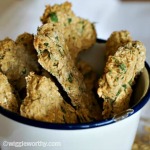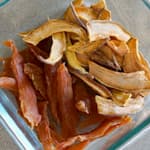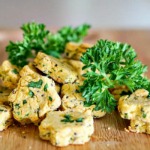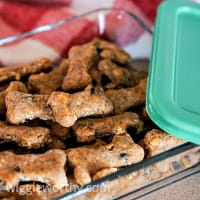Homemade Dog Treats for Liver Disease
Homemade dog treats for liver disease can contain a whole variety of nutritious and tasty ingredients, but it's very important to know which ones are recommended and safe to use, and which ones should be avoided.
Whether your dog has mild/early canine liver disease or has been living with it as a chronic condition, his diet plays an important role in keeping him healthy by supporting healthy liver function.

Giving your best friend homemade dog treats created with liver-friendly, safe and healthy ingredients can add an extra bit of deliciousness to their day, and every dog deserves that right?
- About liver disease in dogs
- Ingredients for dogs with liver disease
- Ingredients to avoid if your dog has liver problems
- Substituting ingredients
- Homemade dog treat recipes for liver disease
About Liver Disease in Dogs
Canine liver disease is fairly common and there are several different types of liver problems in dogs, and also many different causes (including congenital disorders, problems with the liver itself, and other illnesses or disorders which cause damage to the liver).
The most common symptoms of liver disease in dogs include jaundice (yellowing of the whites of the eyes, gums and skin), increased thirst and/or increased urination, vomiting, loss of appetite, lethargy, diarrhea, weight loss, change in stool color, dark urine, distended abdomen.
There can also be neurological symptoms such as disorientation, seizures, vision or behavioral issues and more.
Depending on the causes, and stage, of liver disease it can be severe/acute, or chronic. Prognosis and life expectancy will vary depending on these same conditions.
A veterinarian can run diagnostic tests to check your dog's liver function and figure out exactly what's causing the problem and how to treat/manage it.
Ingredients for dogs with liver disease
Your dog's liver is one of his most important organs and is involved in many bodily functions including metabolizing nutrients, breaking down and eliminating toxins from the body, supporting the immune system and producing enzymes that help with digestion.
If your dog has liver problems the correct diet is hugely important because it can help support his liver function, as well as potentially minimizing, or even preventing further damage.
The best and safest diet for a dog with liver disease should be easy to digest and include:
- Lean protein
- Low fat content
- Fresh fruit and vegetables
- Whole grains
- Omega-3 fatty acids
Because dogs with liver problems can have reduced appetites and may feel nauseous, making sure their food is tasty as well as healthy and nutritious is important.
All of the above is equally important to bear in mind when choosing recipes for homemade dog treats.
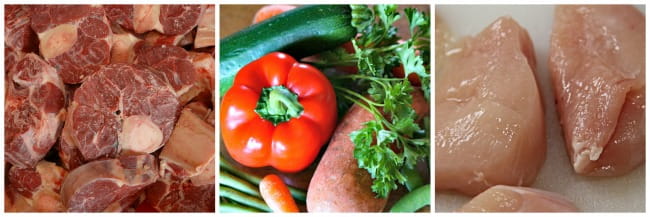
Safe Treat Ingredients for Dogs with Liver Disease
Let's take a look at some of the best ingredients to use when creating homemade dog treats for dogs with liver problems.
PROTEIN
You want to choose lean protein sources such as skinless chicken or turkey, fish, eggs, or low fat cottage cheese. It's important to know that depending on what form of liver disease your dog has will affect his protein requirements. For some a higher protein diet is recommended, for others the opposite.
CARBOHYDRATES & GRAINS
The best grains are complex carbs and include oats, white rice, brown rice, quinoa and barley. Potatoes and sweet potatoes are also good carb sources. Oat flour or rice flour are great choices when baking for dogs with liver disease.
NOTE: for dogs with copper-associated hepatitis or copper hepatopathy refined grains MAY be more beneficial. Expert opinions vary on this.
FRUITS & VEGETABLES
Apples, bananas, blueberries and cranberries are all good choices, as is watermelon. For dogs with liver problems OTHER THAN copper-associated hepatitis or copper hepatopathy, leafy greens such as spinach and kale are nutritious and easy to incorporate into recipes. Likewise for pumpkin, carrots and zucchini
ADDITIONAL INGREDIENTS
In addition to the basics above, there are several different things you can add to your dog's homemade treats to help support and enhance his liver function and to add an extra boost of taste. These include low-fat plain yogurt, cottage cheese, bone broth (no salt added), unsweetened soy milk or low fat dairy milk, unsweetened apple sauce, parsley, turmeric, wheat germ. Coconut oil and omega-3 fish oils are the safest types of oil for dogs with liver disease. Nutritional yeast is beneficial for liver function and makes a safe and tasty addition to homemade treats for dogs with this condition.
Ingredients to AVOID for Dogs with Liver Disease
If your dog has liver disease there are some ingredients and types of foods that need to be avoided.
High fat foods and salt are not safe for dogs with any form of liver disease, but the specific type of liver condition can make a difference in other areas.
Not all liver disease in dogs has the same dietary requirements
While all dogs with liver problems should avoid eating high fat foods, there are other more subtle differences in dietary requirements depending on the type of liver problems your dog has.
Dogs with copper-associated hepatitis or copper hepatopathy also need to avoid foods/ingredients which are high in copper such as dark leafy greens and organ meat.
However, greens such as kale and spinach are safe and beneficial for dogs with different types of liver disease.
When it comes to carbs, dogs with copper-associated hepatitis should avoid complex, whole grains and eat white rice or white flour rather than whole wheat flour or brown rice.
For other dogs with other types of liver problems, complex carbs are preferred.
The specifics and stage of liver disease can also impact how much protein your dog should eat, an increase or a decrease may be recommended by your veterinarian.
Overall I'd recommend discussing diet and off-limits items with your own veterinarian so you know exactly what form of liver disease your dog has and which ingredients are off limits.
Here is a general overview of the ingredients and foods that dogs with liver disease should avoid:
HIGH FAT PROTEIN
Meat sources such as lamb, pork and duck should be avoided as they're high in fat. Organ meat is high in copper so should also not be given to a dog with liver disease.
FAT
Your dog doesn't need a NO fat diet if he has liver disease, but aim for LOW fat. Avoid animal fats, vegetable oils, nuts/nut butters and full fat dairy products.
CARBOHYDRATES & GRAINS
In general most carbohydrates are suitable for dogs with liver disease, but according to experts some specific conditions are better served with complex carbs, others with refined carbs. There is no universal agreement on this and there is currently no specific carbohydrate/grain that is considered unsafe for dogs with liver problems.
FRUITS & VEGETABLES
In addition to the obvious doggy no-no's like rasins, onions and garlic, dogs with liver disease shouldn't be given avocados (they are high in fat) and mushrooms. Although cruciferous vegetables such as broccoli, cauliflower and cabbage can be beneficial, they shouldn't be given raw or in large amounts as they can put strain on the liver.
ADDITIONAL INGREDIENTS
Because the liver processes nutrients from food and filters unwanted or dangerous elements from the body it's important to avoid artificial additives, preservatives, fillers and other similar ingredients in your dog's diet. Sticking with natural, whole foods is the best way to go. Avoid any copper rich foods such as organ meats, nuts and mushrooms in general. Don't use baking powder in recipes for dogs with liver disease.
Ingredient substitution options
Although the dietary guidelines for dogs with liver disease are fairly strict, you can often still use a favorite recipe or try new ones that are not specifically designed for dogs with this condition.
How? By making smart, but simple, substitutions!
For example, to reduce the amount of fat if you're using eggs in your homemade dog treats you can just use the whites and discard the yolk. As a rule of thumb two egg whites are roughly equivalent to one whole egg.
You can also try using a chia or flax egg instead of regular eggs. These are easy to make.
As dog treats should be in addition to an appropriate meal plan you're unlikely to be relying on them to provide essential nutrients and more concerned with making sure they're safe and tasty. Because of this you can replace eggs with other tasty options such as mashed banana, mashed sweet potato or applesauce in your homemade goodies.
The best types of flour to use when making treats for dogs with liver disease are oat flour or rice flour. Both of these can be found in most grocery stores and substituted for white or whole wheat flour in recipes.
Because each type of flour is different they're not a like-for-like substitution in terms of volume.
If you use rice flour you need to calculate the substitution at 3/4 cup rice flour for each cup of whole wheat/white flour. You will also need to add a little extra liquid to the recipe. For oat flour you'll find 1 1/4 cup of oat flour is roughly equal to one cup of whole wheat or white flour.
Check out this page to learn more about the different types of flours you can use to make dog treats and this page to see more substitution options for common dog treat ingredients.
Treat Recipes for Dogs with Liver Disease
You Might Also Like These pages...
- Home
- Treats for Liver Disease
